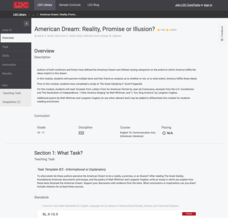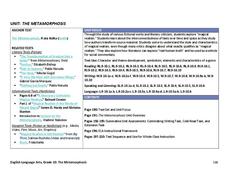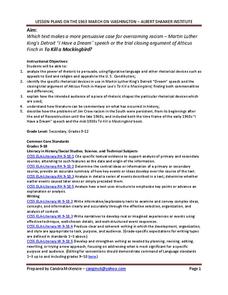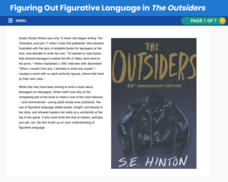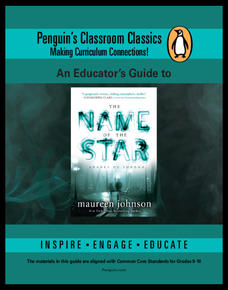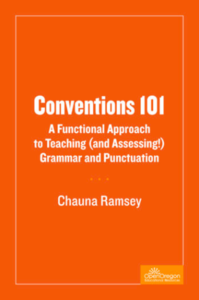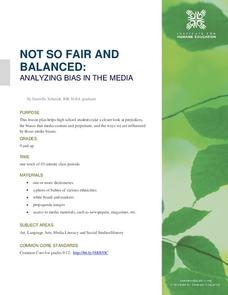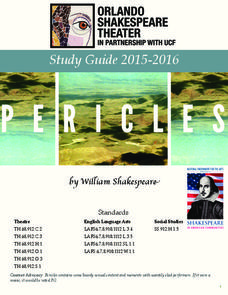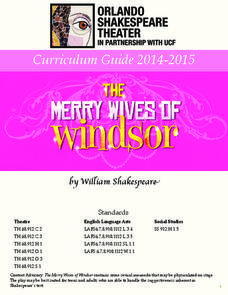ReadWriteThink
Sonic Patterns: Exploring Poetic Techniques Through Close Reading
Robert Hayden's poem "Those Winter Sundays" serves as the anchor text in a five-part lesson plan that takes the mystery out of poetry analysis by modeling explicit strategies for pupils to employ to conduct a close reading of a poem....
Literacy Design Collaborative
American Dream: Reality, Promise or Illusion?
Dream or nightmare? Class members craft a synthesis essay with textual to determine to what extent the United States has fulfilled the ideas embodied in the America Dream.
A&E Television
The World Wars
Contemporaneously known as The Great War, World War I had never seen its match on the global stage—until World War II. An engaging set of resources designed to extend a viewing of the History Channel's The World Wars features discussion...
California Department of Education
Plagiarism is Stealing!
Stop, thief! Do your pupils understand the consequences of plagiarism? Lesson three of six in a series of college and career readiness activities demonstrates the dangers of taking credit for someone else's work. Learners engage in...
Louisiana Department of Education
The Metamorphosis
How can something be true even if it didn't happen? Invite your classes to investigate the truths found in the world of magical realism as they analyze short stories, poems, informational texts, video, and art from this genre.
Common Sense Media
Private Today, Public Tomorrow
What responsibility do we have to protect the privacy and safety of others when posting information about them online? This is an essential lesson for every learner today experiencing their social and professional worlds in an online...
Word Up Project
Mini Games
You've got a few minutes left at the end of class to practice vocabulary, but what can you do other than call out a word and ask for definitions? Play one of these 12 quick games! Each game is explained in detail and easy to modify for...
National Behaviour Support Service
Academic Vocabulary Building Activities
Suggestions for using Roberto Marzano's six-step approach to academic vocabulary instruction are detailed in a packet that includes graphic organizers, worksheets, and activities.
Common Sense Media
My Online Code
Approach ethical online behavior with a series of activities geared toward teaching pupils about digital citizenship. After a brief discussion about ethics, small groups inspect a fictional social networking profile with ethics in mind....
Albert Shanker Institute
Making the Case for Equality: A Comparison
Martin Luther King Jr's " I Have a Dream" speech and Atticus Finch's closing argument during the trial of Tom Robinson both address the societal need to overcome racism. After examining the rhetorical devices and figurative language used...
ReadWriteThink
Heroes Are Made of This: Studying the Character of Heroes
What makes heroes and villains? A six-part unit plan asks young scholars to explore the concept of heroism and the characteristics they consider heroic and unheroic. Groups create character maps that focus on how characters are shaped by...
PBS
Exploring the Drive to Create in Frankenstein
Is it hubris that drives the creative process? Is it the desire to be remembered long past death? An interactive asks readers of Mary Shelley's novel Frankenstein and Percy Shelley's poem "Ozymandias" to consider what this wife and...
PBS
Exploring First-Person Narrative
If you really want to know, this is a terrific lesson all about narratives, which is just a fancy way of saying telling stories. And you get to do it without being phony or anything. My favorite part is that you get to read a passage...
PBS
Shifting Perspectives in Toni Morrison's Beloved
An interactive provides readers with an opportunity to record their reactions to Beloved, Toni Morrison's powerful narrative based on the life of Margaret Garner. Prompts ask them to consider how the shifting point of view contributes to...
PBS
A Time and Place: The Importance of Setting in To Kill a Mockingbird
A strong community acts as a family during difficult times. The evidence for the family aspects of Maycomb is abundant in Harper Lee's To Kill a Mockingbird, and it is the focus of a instructional activity on the importance of setting as...
PBS
The Legacy of To Kill a Mockingbird: Continuing Atticus’s Fight for Justice
Tom Robinson was only one man in Harper Lee's To Kill a Mockingbird, but he represents many people throughout history who have not found justice in the American justice system. Language arts students discuss the theme of social justice...
PBS
Figuring Out Figurative Language in The Outsiders
S.E. Hinton's The Outsiders is well known for its relatable characters and plot, but don't forget how effective the book's figurative language can be! Check out an interactive resource that explores how figurative language comes alive...
Penguin Books
An Educator's Guide to The Name of the Star by Maureen Johnson
Jack the Ripper terrorized London in the late 1800s. An educator's guide for the novel The Name of the Star places the historical figure in a modern context. Readers complete a pre-reading activity before answering a series of discussion...
Open Oregon Educational Resources
Conventions 101: A Functional Approach to Teaching (and Assessing!) Grammar and Punctuation
Let's eat kids. Let's eat, kids. Commas make a difference! Conventions 101: A Functional Approach to Teaching (and Assessing!) Grammar and Punctuation explains ways to teach the importance and use of conventions. Learners take part in...
Read Write Think
Book Report Alternative: Rewind the Plot!
Have you ever looked for a new way to teach an old concept? Scholars thinking about the rising action of a story in a whole new perspective. However, Book Report Alternative: Rewind the Plot! challenges readers and allows for much...
Scholastic
What’s the Good Word? Etymology Project Guidelines
Who named the shapes, or the days of the week? Should words be removed from the dictionary if they're no longer commonly used? Are there too many words in the English language? Language arts students explore these and additional...
Institute for Humane Education
Not So Fair and Balanced: Analyzing Bias in the Media
Life is not always fair. Who's heard that before? This same concept moves to a larger scale using prejudice and bias. Pupils discuss where prejudice attitudes derive and how they develop throughout life. Reading comprehension...
Orlando Shakes
Pericles: Study Guide
Everyone loves a great riddle, right? Everyone except for the characters in Shakespeare's Pericles, who will be killed unless they answer the king's riddle correctly. With the study guide, scholars use words coined by Shakespeare to play...
Orlando Shakes
Merry Wives of Windsor: Study Guide
What does the character Falstaff mean when he says "I was beaten myself into all the colors of the rainbow"? Using the Merry Wives of Windsor curriculum guide, scholars unlock meaning by paraphrasing lines from the play. Pupils also...



